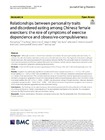| dc.contributor.author | Yang, Peiying | |
| dc.contributor.author | Wang, Ting | |
| dc.contributor.author | Herold, Fabian | |
| dc.contributor.author | Muller, Notger | |
| dc.contributor.author | Taylor, Alyx | |
| dc.contributor.author | Szabo, Attila | |
| dc.contributor.author | Granziol, Umberto | |
| dc.contributor.author | Cook, Brian | |
| dc.contributor.author | Landolfi, Emilio | |
| dc.contributor.author | Solmi, Marco | |
| dc.contributor.author | Zou, Liye | |
| dc.date.accessioned | 2023-03-08T15:13:52Z | |
| dc.date.available | 2023-03-08T15:13:52Z | |
| dc.date.issued | 2022-11-17 | |
| dc.identifier.citation | Yang, P., Wang, T., Herold, F., Müller, N. G., Taylor, A., Szabo, A., Szabo, A., Granziol, U., Cook, B., Landolfi, E., Solmi, M., & Zou, L. (2022). Relationships between personality traits and disordered eating among Chinese female exercisers: the role of symptoms of exercise dependence and obsessive-compulsiveness. Journal of Eating Disorders, 10(1), 169. https://doi.org/10.1186/s40337-022-00679-7 | en |
| dc.identifier.issn | 2050-2974 | |
| dc.identifier.uri | https://aecc.archive.knowledgearc.net/handle/123456789/177 | |
| dc.description | Available under License - Create Commons Attribution: https://creativecommons.org/licenses/by/4.0/ | en |
| dc.description.abstract | Background: Although numerous studies have examined associations between personality traits and eating disorders in females, few studies have been conducted on female exercisers. Given the high risk of disordered eating in
female exercisers, this study investigated the associations between the Big Five personality traits and disordered eating in female exercisers, and further explored the potential mediators, namely exercise dependence symptoms, and
obsessive–compulsive symptoms underlying this association.
Methods: A total of 295 female exercisers aged between 18 to 67 years (M= 22.11, SD= 6.65) participated in this
study.
Results: Negative and statistically signifcant correlations between conscientiousness (r=− 0.17, p<0.01), emotional stability (r=− 0.27, p<0.001) and agreeableness (r=− 0.18, p<0.01) and disordered eating were observed in
our sample of female exercisers. The multiple mediation analyses revealed that exercise dependence symptoms and
obsessive–compulsive symptoms mediate the relationship between conscientiousness (β=0.016, CI=[0.003, 0.031]),
emotional stability (β=-0.012, CI=[− 0.028, − 0.002]), and disordered eating in female exercisers, whereas obsessive–
compulsive symptoms (β=− 0.041, CI=[− 0.088, − 0.001]) but not exercise dependence symptoms are a mediator
of the relationship between agreeableness and disordered eating.
Conclusions: Our fndings can be used to improve the screening procedures for eating disorders in female exercisers as they contribute to a better understanding of the psychological mechanisms that underlie the associations
between the Big Five personality traits and disordered eating. | en |
| dc.language.iso | en | en |
| dc.publisher | Journal of Eating Disorders | en |
| dc.subject | Exercise dependence | en |
| dc.subject | Obsessive-compulsive symptoms | en |
| dc.subject | Big Five personality traits | en |
| dc.subject | Disordered eating | en |
| dc.subject | Female exercisers | en |
| dc.title | Relationships between personality traits and disordered eating among Chinese female exercisers: the role of symptoms of exercise dependence and obsessive-compulsiveness | en |
| dc.type | Article | en |
| dc.identifier.doi | https://doi.org/10.1186/s40337-022-00679-7 | |
